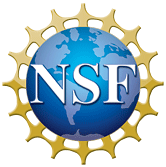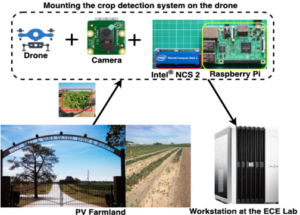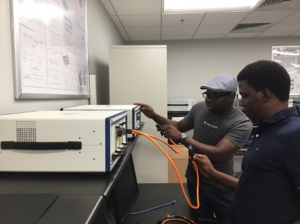
Targeted Infusion Project: Infusing 5G and IoT Learning and Practice into Electrical and Computer Engineering
Curriculum (supported by NSF)
Project Number: HRD-2205891
Duration: Sep 2022 – Aug 2025
PI: Xiangfang Li; Co-PI: Xishuang Dong, Kelvin Kirby, Lijun Qian
Department of Electrical & Computer Engineering
Roy G. Perry College of Engineering
Prairie View A&M University
Prairie View, TX 77446
Project Summary:
The Historically Black Colleges and Universities Undergraduate Program (HBCU-UP) through Targeted Infusion Projects supports the development, implementation, and study of evidence-based, innovative models and approaches for improving the preparation and success of HBCU undergraduate students so that they may pursue science, technology, engineering, or mathematics (STEM) graduate programs and/or careers. This project seeks to enhance the curriculum and student training at Prairie View A&M University (PVAMU) by incorporating state-of-the-art 5G and Internet of Things (IoT) technologies that are critical to people’s lives and the nation’s economy.
The project strives to intrigue students’ learning passion by systematically designing/redesigning Electrical and Computer Engineering (ECE) curricula at PVAMU through incorporating state-of-the-art technologies and much-needed practical skills. Furthermore, the project will collaborate with industrial partners to bridge the gap between the academy and industry to ensure that the skills and knowledge of PVAMU STEM students are up-to-date and relevant in current 5G and IoT technologies. In addition, the results of the activities will be disseminated to the broader communities through publications and conference presentations, and project outcomes, such as the created courses, modules, and learning materials will be held at a dedicated website and be made available for other educators to use. This project will have a significant impact on the education and research in the ECE department, and greatly improve students’ knowledge in emerging technologies, better preparing them for graduate study and the STEM workforce.
Results:
I. Publications
This material is based upon work supported by the National Science Foundation under Grant No. 2205891.
Any opinions, findings, conclusions, or recommendations expressed in this material are those of the author(s) and do not necessarily reflect the views of the National Science Foundation.
Journal papers:
- Jovan Cain, Xiangfang Li, Mulugeta Haile, Lijun Qian (2023). “Digital Twin Modeling and Optimal Control of Soft-Bodied Robotics Using Reservoir Computing,” in preparation.
Books
- Xishuang Dong, Lucy Nwosu, Sheikh Rufsan Reza and Xiangfang Li (2023). “Effective Screening and Face Mask Detection for COVID Spread Mitigation using Deep Learning and Edge Devices,” book chapter in “Internet of Things – New Insights”, accepted.
Conference papers:
II. Curriculum Development
New courses created:
- ELEG 2304: Introduction to Python for Engineering
- ELEG 4318: Edge Computing
- ELEG 4306: Machine Learning for Engineering Applications
Existing courses upgraded:
- ELEG 4333: Computer Networks
- ELEG 4247/4248: Senior Design and Professionalism I/II
III. Students training
IV. Seminar series
Coming soon.
Contact information:
Office: NENR Building Room 336 Phone: (936) 261-9918 Fax: (936) 261-9930 E-mail: Xiangfang LiLast Modified: Aug. 2023


